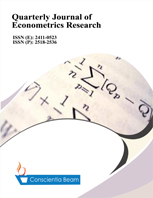Examining Long Run Relationship between Household Debt and Household Savings in South Africa – An Error Correction Model and Granger Causality
DOI:
https://doi.org/10.18488/journal.88/2016.2.1/88.1.17.27Abstract
Savings is vital to maintain and expand an economy’s capital structure and economic growth. Saving is an important component of economic growth model in that investments are created from savings. Investment allows an opportunity to improve technology and thereby increasing levels of productivity. Increasing levels of productivity lead to increased real wages. The end result of increasing real wage is improvement of the welfare of the nation. Nevertheless, savings have been declining over the years, placing the South African economic development agenda in jeopardy. Since 1984, savings have deteriorated significantly, reaching a mere 15.3 percent of GDP in 2009 (SARB, 2010). The decline in savings at the beginning of the 1980s coincided with increased access to credit by households. Alongside these developments net wealth of the households increased relative to their disposable income (South African Reserve Bank (SARB), 2002). Mutyaba (2013) states that savings declined considerably during the last decade in South Africa. In 2006, for example, savings turned negative. In contrast, during the same year the debt increased to its highest level ever Mutyaba (2013). Clearly voluntary savings are becoming even more unaffordable by a number of households in South Africa, mainly amongst the low earners (Chiroro, 2010).This study uses Engle & Granger cointegration approach and granger causality to examine the link between debt and savings in South Africa.

